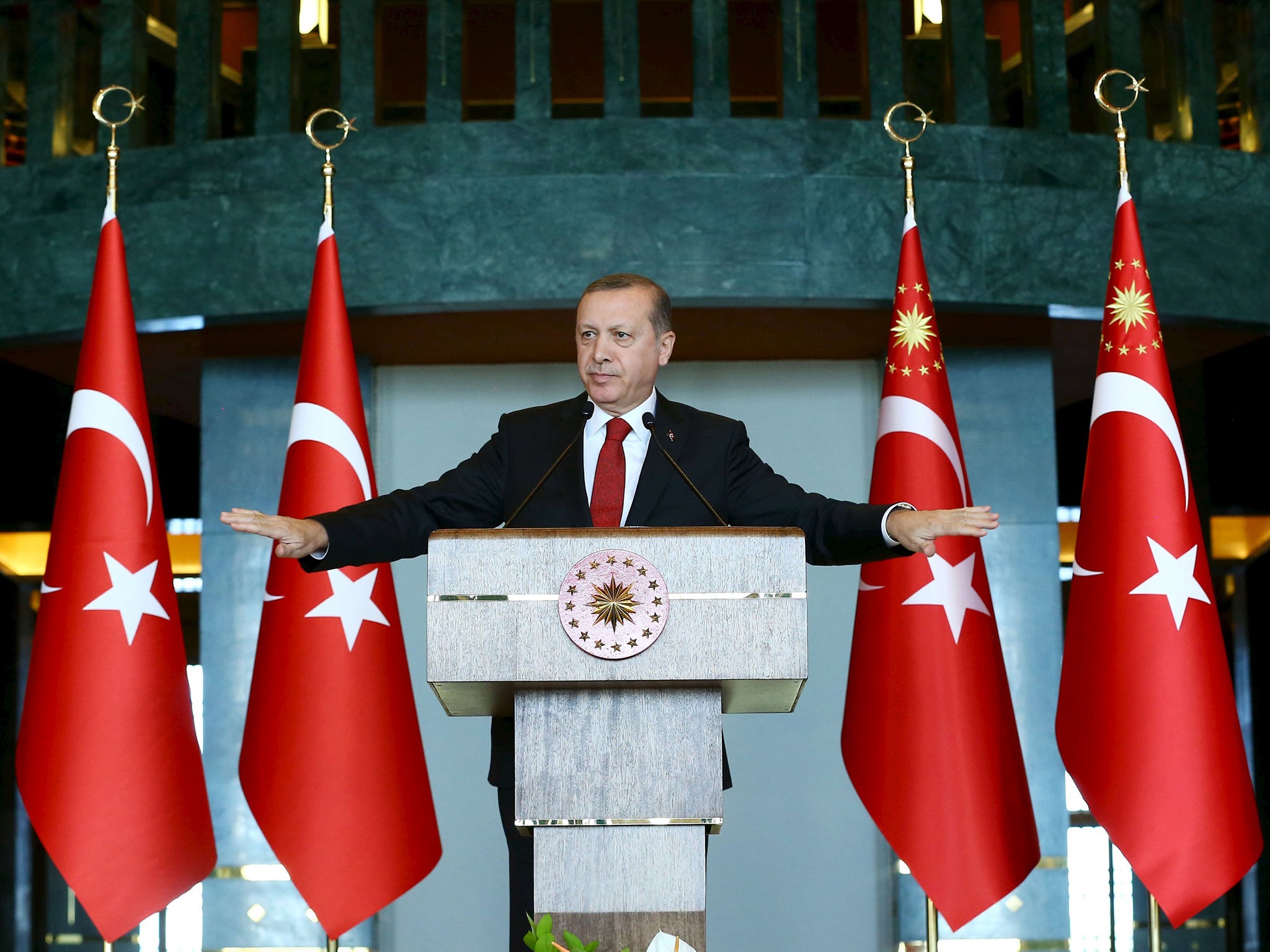Turkey's sabre-rattling at the Syrian border means the prospect of peace is more distant than ever
If Erdogan intervenes in this complex conflict, he'll take his country down with him

Your support helps us to tell the story
From reproductive rights to climate change to Big Tech, The Independent is on the ground when the story is developing. Whether it's investigating the financials of Elon Musk's pro-Trump PAC or producing our latest documentary, 'The A Word', which shines a light on the American women fighting for reproductive rights, we know how important it is to parse out the facts from the messaging.
At such a critical moment in US history, we need reporters on the ground. Your donation allows us to keep sending journalists to speak to both sides of the story.
The Independent is trusted by Americans across the entire political spectrum. And unlike many other quality news outlets, we choose not to lock Americans out of our reporting and analysis with paywalls. We believe quality journalism should be available to everyone, paid for by those who can afford it.
Your support makes all the difference.Russian Foreign Minister Sergei Lavrov’s assessment of the situation in Syria as “complicated” must be the understatement of the year: it is three-dimensional chess with nine players and no rules, as one US strategic analyst said.
The latest ray of light - the accord reached by the International Syria Support Group (ISSG) last week in Munich, looks to be extinguished by Russia’s bombing of hospitals and schools in northern Syria, causing dozens of civilian casualties. The cornerstone of the accord is UN Security Council Resolution 2254 of 18 December 2015, which also demands that all parties immediately cease attacks against all civilian objects, including medical facilities and personnel.
Foreign Minister Lavrov has stated that the main result of the the accord is the confirmation of this resolution and has expressed a common determination to help alleviate the suffering of the Syrian people. Unfortunately, these good intentions are undermined by actions on the ground.
The situation is further complicated by the advance of the Kurdish YPG (People’s Defence Units), not only from west of the Euphrates but also towards Azaz close to the Turkish border, north of Aleppo. Menagh airbase 6 kilometers south of Azaz has been recaptured and now the YPG is advancing on Azaz, which will cut the corridor supplying insurgents in Aleppo from Turkey.
The Turkish Prime Minister, Ahmet Davutoglu, has declared Azaz yet another “red line” for Turkey and has threatened with retaliation if Azaz is threatened. For four days, Turkish artillery has shelled YPG positions and at Russia’s request the UN Security Council has met to discuss the situation. All 15 members have expressed concern about Turkey’s action and have called on Turkey to comply with international law. The EU and the US have also urged Turkey to show restraint.
The US and Russia will co-chair a UN task force to work on “a long-term, comprehensive and durable” end to hostilities - but their task is complicated, not only by the targeting of civilian facilities, but also Turkey’s sabre-rattling. The most ominous threat is Turkey’s call for a cross-border operation, ostensibly directed at Isis, but which will forestall Kurdish plans for an autonomous adminstration along the Turkish border. Turkey’s plans are seconded by Saudi Arabia and its gung-ho minister of defence, King Salman’s son, Mohammed bin Salman, who is clearly not content with just the Saudis’ war against the Houthi rebels in Yemen.
This is, in fact, President Erdogan’s last bite at the apple, as his strategy of overthrowing Bashar al-Assad’s Shia-backed regime has been thwarted by Russia’s intervention. Besides, Erdogan must have enough on his hands, dealing with the war against the PKK and the Turkish Kurds’ demand for autonomy.
Last June with the capture of Tel Abyad on the Turkish-Syrian border by the YPG another piece fell into place for Syria’s Kurds. Also for Turkey. President Erdogan declared that Turkey would never allow the establishment of a state in northern Syria,and the Turkish military was given instructions to prepare for a cross-border operation. This would have the added effect of bolstering support for the governing AK Party in a new election, as the AKP had just lost its overall majority in the June elections.
However, the Turkish military demurred and insisted on a written directive. At the same time, the Chief of the General Staff pointed out that such a move needed to be justified under international law, not to speak of the reactions from the US and Syria as well as Russia and Iran. Consequently, Prime Minister Davutoglu announced Turkey had “no immediate plans” for such an operation despite a military build-up on the Syrian border.
In October 2012, the Turkish parliament authorised cross-border military operations into Syria “when necessary”, and this mandate was prolonged last September. Erdogan has regretted Turkey didn’t go into Iraq together with the US in 2003 and remarked: “"I don't want the mistakes committed in Iraq repeated in Syria." There is the temptation to double down on his losses, but if Erdogan does, he will bring Turkey down with him.
Robert Ellis is a commentator on Turkish affairs in the Danish and international press
Join our commenting forum
Join thought-provoking conversations, follow other Independent readers and see their replies
Comments